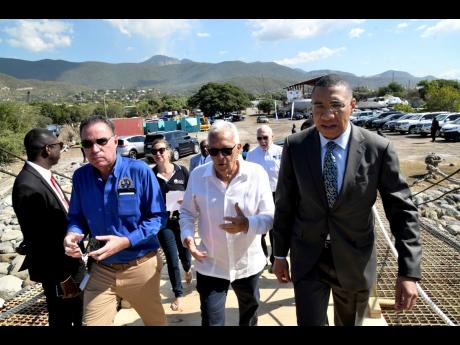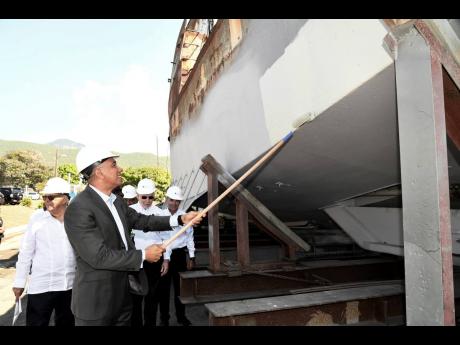PM, leaders lament inefficiencies of public sector
Lamenting that Tuesday’s launch of the German Ship Repair Jamaica Limited project at Harbour Head in Harbour View, St Andrew, took 20 years from conception to fruition, Prime Minister Andrew Holness admitted that the country continues to pay dearly for the ineffectiveness of the public sector. In fact, tardiness is so well entrenched in the public sector that it is now the acceptable standard, he said.
“Risk-taking, moving fast is almost a bad word in the civil service, but we pay a price for it in that everything else moves slowly. And those who have fed you this narrative for years and fed your own thinking for years have done us a great disservice. So we don’t trust ourselves to do anything and the process of getting projects done is very combative, and we pay the price. It takes 20 years to get a project like this done,” Holness acknowledged while delivering the keynote address.
He continued: “Our public bureaucracy is such that again, a kind of narrative has been fed in the mind of the public about our inefficiency and corruption and all kinds of things. What it has done, it has crippled the civil service. It has crippled the public bureaucracy. No one wants to move faster than they should. No one is being an intrapreneur, meaning someone in an organisation who takes risks to get things done.”
The prime minister said that a lot of negative things can happen in the two-decade time frame from conception to the delivery timeline for projects.
“Murder rate, people are unemployed, all kinds of issues. So the new narrative must be, How do we comply with rules and get things done efficiently? That is the new public sector that we are trying to build, and we have started and recognise the problem. And a lot of it has to do not just with the rules that we have put in place, but the mindset and culture,” Holness said.It is a sentiment that has also been shared recently by leaders in both the private and public sector.
Minister of Legal and Constitutional Affairs Marlene Malahoo Forte admitted to the inaugural National Security Advisor’s security seminar at the AC Marriot, New Kingston, on January 12 that the entrenched culture whereby public-sector employees work at their own pace is seriously undermining the public sector reform process. This, she admitted, is hurting the Government’s effort to pass laws that are critical to reining in the murder rate, which saw 1,498 murders being recorded for last year.
“There are many big challenges, but it appears as if the public sector is not culturised into meeting deadlines. I hear private sector does a lot better at that … but it is something that we have grown unconscious of: the need to work in set deadlines,” she admitted.
And speaking at the launch of the Jamaica Business Development Corporation’s Essential Oils Incubator Project last December, executive director Valerie Veira explained that technocrats at the Ministry of Finance and the Public Service were immediately sold on the idea and signed off on it after the first pitch. However, despite this strong backing, getting the project off the ground was painfully slow and next to impossible.
“The committee approved the concept, and, in fact, approved the budget. At that stage it went well … After that it was like pushing hot molasses up a hill to get other things done,” Veira said but did not share any specifics of the problems encountered.


